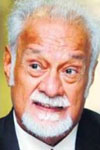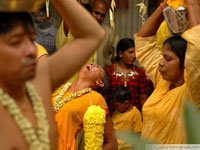Zalina Maizan Ngah, Bernama
The Shah Alam High Court will be at the centre of attention this Friday when judge Datuk Mohd Zaki Md Yasin delivers the verdict on the sensational murder trial of a Mongolian woman, Altantuya Shaariibuu.
Mohd Zaki's verdict will not only decide the fate of the three accused - Chief Inspector Azilah Hadri and Corporal Sirul Azhar Umar (both members of the Special Action Unit, UTK) and a renowned political analyst and strategist Abdul Razak Abdullah Baginda - but will also end wild speculations and rumours relating to the case.This high-profile case has generated a big following especially when there were rumours of a public figure linked to the murder, revelations of intimate involvement of one of the accused with the victim and some shady business dealings.
The trial on the gruesome murder of Altantuya who body was blown up using explosives to cover up the crime went on for almost two years with the prosecution winding up their case on June 23.
If the court's decides a prima facie against the trio, they will have to make their defence or if otherwise they will be discharged and freed.
KEEPING UP THEIR HOPES
When inquired by Bernama on the sidelines of the court proceedings what they would do if they were freed, Azilah, 32, who has an adopted child stated that "there are too many things to do, but above all I want to cuddle my child and hold a thanksgiving feast".
Sirul Azhar, 36, when asked the same only offered a smile, typical of this former aide de camp for VIPs who is known to be discreet. On the dock he sits quietly and once in a while he turns toward the members of the media sitting behind him to ask for sweets and pickled fruits.
Meanwhile Abdul Razak, 48, the Executive Director for Malaysian Strategic Research Centre wants to take a break overseas with his only daughter Rowena when everything is over.
Throughout the trial, Abdul Razak was accompanied by his wife Mazlinda Makhzan, his parents and close family members. However, at the initial stages, Mazlinda's presence made Altantuya's father, Shaariibuu Setev frown as he claimed she had verbally abused him and court officers went all out to keep them apart.
Even when Mazlinda was asked on the fate of her husband, she replied: "I will leave it to Allah. Razak is innocent."
Yet the drama did not end there. The 151 day proceeding witnessed many bizarre and hilarious incidents. Apart from this there was also a change in the presiding judge and the clash between two counsels on who should be representing one of the accused.
BIZARRE INCIDENTS
Abdul Razak caught the attention of the media with some of his antics in the courtroom. He had been noted to throw tantrums and even went to the extent of kicking the dock and cursing others. He kept pushing his counsel Wong Kian Kheong to speed up the trial without any deferment and this certainly incensed Deputy Public Prosecutor Tun Abdul Majid Tun Hamzah who ticked of Wong by saying that Abdul Razak is not the only person in prison.
The media hype had certainly attracted the wrong type of crowd into the courtroom as well. It was obvious some wanted to take advantage of the media coverage to be on the limelight, but for the wrong reasons.
Readers would probably recall the presence of a woman dressed like a counsel claiming that she was a representative of peace organisation and had the authority of the police and the Attorney-General's Department.
She wanted the media attention and would closely follow the cameras and even refused to take a back seat. When there were no seats available she would insist the court officials to make special seating arrangements for her. Her presence was unwelcome and she even dared to intercept the judge.
When her behaviour became intolerable, not only because of her constant nagging but also her handphone that rang often, a police report was made and she eventually disappeared.
During the initial stages of the hearing there appeared another woman who claimed that she was a representative of a women's right organisation carrying a placard condemning Abdul Razak for the brutal slaying of Altantuya.
The one-woman demonstration did not go down well with the police as it was seen as disturbing the public order and the police gave her a warning and told her to leave the court compound.
However, the woman in her late 40s remained unfazed and instead shouted back at the unarmed policemen, "I have the rights, you police can stop me using your firearms, let the public be the witness".
151 DAY TRIAL
Azilah and Sirul Azhar who covered their faces using the 'ninja' mask set a new trend for accused in other cases and when inquired by Bernama why they did so Azilah had this to say: "Life is long way to go, there are some things best kept secret."
Another drama that unfolded at the 151 day trial was that a policeman stationed at the courtroom Lans Corporal Othman Abdul Rahman, 47, collapsed when accompanying the three accused to the courtroom and was later confirmed dead due to heart failure.
Azilah and Sirul Azhar were alleged to have murdered Altantuya between Lot 12843 and Lot 16735 Mukim Bukit Raja, Shah Alam, between 10 pm 19 Oct and 1 am 20 Oct 2006. The duo was well versed in the use of explosives and was said to have taken the plastic explosives, detonator cord and CLC (cutting liner charge) from the UTK storeroom.
Abdul Razak who is alleged to have abetted with the two UTK members, is said to have committed the crime on Oct 18 2006 at his office at 10th Floor, Bangunan Lembaga Getah Asli Malaysia (LGAM), Jalan Ampang in Kuala Lumpur and the motive of the murder is due to demands and threats from Altantuya.
Based on the evidence adduced from the prosecution witness Deputy Superintendent Muhammad Koey Abdullah, the explosives were probably placed in the victim's mouth or the upper torso and the impact reduced her bones to fragments. On the puzzle why no traces of the victim's clothing were found, Dr Mohd Shah Mahmood, the Head of the Forensic Medical Department at the Kuala Lumpur Hospital (HKL), explained the victim was probably stripped of her clothing before being blown up.
JUDGE TO PORE OVER 6,000 PAGES OF PROCEEDING NOTES
However, lawyer J. Kuldeep Kumar and Datuk Hazman Ahmad who represented Azilah were persistent that their client was no way involved in the murder and the Azilah was not the one who led the police to the crime scene.
Sirul Azhar's counsel Kamarul Hisham Kamaruddin, Hasnal Redzua Marican and Ahmad Zaidi Zainal pleaded their client's innocence and stated that he was victimised just because Altantuya's jewellery were found his home. On Atlantuya's blood stained sneakers found on Sirul Azhar's four wheel drive, they claimed anyone could have left it there as the vehicle could be accessed by others as well.
Wong who represented Abdul Razak held that his client had nothing to do with Altantuya's murder and throughout the trial there was no proof that the murder was carried out under Abdul Razak's behest. He also questioned the failure of the prosecution to call several senior police officers during the trial.
Nevertheless, Mohd Zaki will make his decision based on the evidence provided by the 84 witnesses that has been compiled into 6,000 pages of proceeding notes.
Prior to delivering the decision on the main charge, Mohd Zaki is expected to decide on the prosecution's application to challenge the credibility of Lans Corporal Rohaniza Roslan (Azilah's girlfriend), the decision on trial within trial on Altantuya's jewellery found at Sirul Azhar's home and on the statement by police that Azilah is the one who led them to the crime scene.
Nonetheless, all the allegations and speculations will be put to rest on Friday when Mohd Zaki delivers his verdict.






 “Even if the helicopter deal is cancelled, PAC is duty-bound to investigate the highly dubious and controversial procurement process, as this runs counter to all principles of accountability, transparency, integrity and good governance,” Lim said in a statement today.
“Even if the helicopter deal is cancelled, PAC is duty-bound to investigate the highly dubious and controversial procurement process, as this runs counter to all principles of accountability, transparency, integrity and good governance,” Lim said in a statement today. Zahar also accused Najib (left) of providing Prime Minister Abdullah Ahmad Badawi, who took over the defence portfolio on Sept 17, with an “inaccurate” report pertaining to the contract.
Zahar also accused Najib (left) of providing Prime Minister Abdullah Ahmad Badawi, who took over the defence portfolio on Sept 17, with an “inaccurate” report pertaining to the contract. Former Malaysia Deputy Prime Minister Musa Hitam shrewdly diagnosed the multiple diseases afflicting the ailing United Malays National Organisation, the country’s biggest political party and the leader of the ruling national coalition, when he talked to the press after launching a forum on Oct 22.
Former Malaysia Deputy Prime Minister Musa Hitam shrewdly diagnosed the multiple diseases afflicting the ailing United Malays National Organisation, the country’s biggest political party and the leader of the ruling national coalition, when he talked to the press after launching a forum on Oct 22. 




